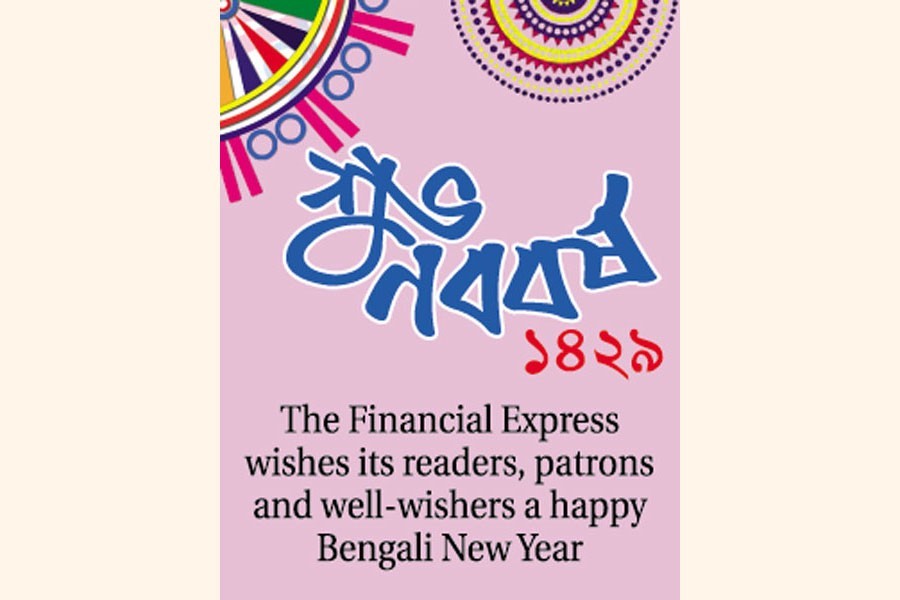Bangladesh welcomes the Bengali New Year 1429 today with full-dress Baishakhi enthusiasm and pageant after the lapse of two years lost in the gorge of coronavirus pandemic.
The first day of the solar calendar, Pahela Baishakh, is featured with Halkhata or the opening of new business account books for the year that just dawns. Traders offer sweets to customers on the day.
Pahela Baishakh is one of the most colourful and biggest festivals through which the Bengalis bid farewell to the old year (1428 in this case) and rings in the new year.
Mangal Shobhajatra, a mass procession seeking universal wellbeing, begins at 9:00 in the morning with the marchers chanting the theme for this year -- 'Nirmol Koro Mongol Koro Molin Mormo Muchhaye'.
On this occasion, people from all walks of life wear traditional dresses. Women wear white saris with red frills and adorn themselves with bangles, flowers, and tips, while men get donned in attires like white pyjamas and panjabi or kurta.
City-dwellers usually start the day with the traditional breakfast of 'panta bhat (soaked rice)', green chilli, onion and fried fish at Ramna Park, Suhrawardy Udyan, Dhaka University campus, Rabindra Sarobor at Dhanmondi and other amusement spots.
However, this time around, the New Year celebrations fall in the Muslim month of fasting -- Ramadan.
Important buildings and establishments as well as city streets and islands are generally illuminated with colourful lights and graffiti painted on the walls that signify the arts, culture and heritage of the country.
In the meantime, security measures have been beefed up in and around lush-green Ramna Batamul grounds to facilitate celebration of the Bengali New Year.
Rapid Action Battalion (RAB) director-general Chowdhury Abdullah Al Mamun said, "There is no fear of attack or sabotage centering the celebration of Pahela Baishakh..."
He made the remark on Wednesday afternoon while answering queries from newsmen during his inspection of the security measures around Ramna Batamul where the main event of Nababarsha is staged to herald the New Year.
"Forgetting the past mistakes and shocks of failures, Bangla Nababarsha is celebrated in expectation of happiness, peace and prosperity," the RAB chief added.
Our DU Correspondent reports that Dhaka University authorities have chalked out various programmes to celebrate Pahela Baishakh on the day. The authorities have restricted all kinds of programmes to be concluded by 5pm. And mask wearing is a must.
To celebrate the day, DU Fine Arts Faculty will take out the traditional 'Mangal Shobhajatra' from the Teacher-Student Centre (TSC) at 9am for the under-work project of Metro Rail.
The pageant will come round to the TSC after parading from Memory Eternal on the campus, said a press release.
On Wednesday, after observing the preparation of the Mongol Shobhajatra in the DU Fine Arts Faculty area, Vice-chancellor Prof Dr Md. Akhtaruzzaman urged celebrating the occasion "peacefully, maintaining health guidelines and taking cautions for the ongoing metro-rail-project activities on the campus".
The university authorities have taken foolproof security measures to celebrate Pahela Baishakh peacefully.
They have put restrictions on the wearing of festival masks and carrying bags on the campus. But some masks which are produced by DU Fine Arts Faculty are allowed. "To toot Bhubhujela whistle on the campus will not be allowed on the day and hawkers also will not be allowed to sell these on the campus," the release says.
Enough CCTV cameras will be set up on the day and the authorities asked the cops for monitoring.
"All programmes on the campus must end by 5pm. Except for vehicles carrying DU stickers, other vehicles will not be allowed in the university from 7pm on April 13 while all kinds of vehicular movement will remain suspended on the campus on April 14. Outsiders will not be allowed in after 5pm on April 14," it adds.
Some historians attribute the Bengali calendar to 7th-century king Shashanka, which was later modified by Mughal emperor Akbar for the purpose of tax collection.
During the Mughal rule, land taxes were collected from Bengali people according to the Islamic Hijri calendar. This calendar was a lunar calendar, and its new year did not coincide with the solar agricultural cycles.
Akbar asked royal astronomer Fathullah Shirazi to create a new calendar by combining the lunar Islamic calendar and solar Hindu calendar already in use, and this was known as Fasholi shan (harvest calendar).


